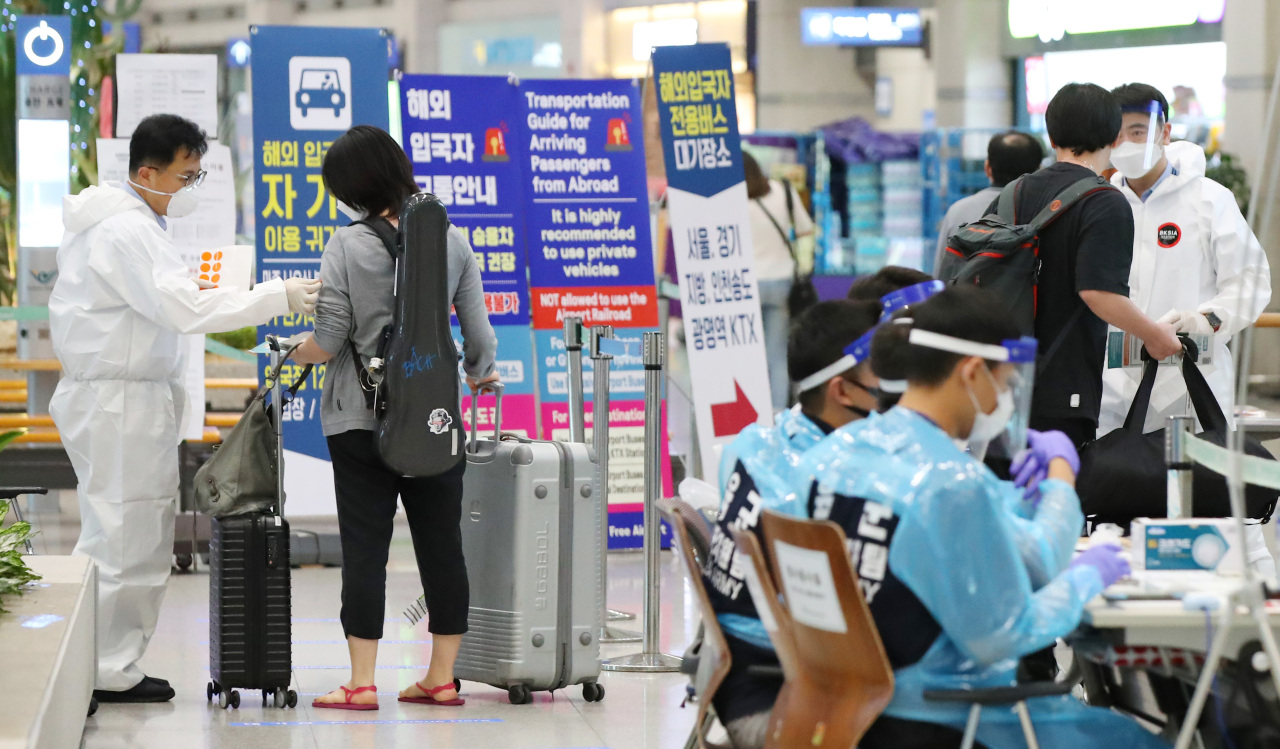 |
(Yonhap) |
Arrivals from two more countries with high infection rates of the novel coronavirus will be required to submit a negative COVID-19 test result to enter South Korea starting from Monday, health authorities said Wednesday.
Two more countries were added to the list, Sohn Young-rae, a senior Health Ministry official said, without revealing the names of the countries, citing diplomatic reasons. The two countries are believed to be the Philippines and Uzbekistan.
Since Monday, the government has required those traveling from “high-risk” countries -- Bangladesh, Pakistan, Kazakhstan and Kyrgyzstan -- to submit certificates issued within 48 hours proving they tested negative for the coronavirus on a polymerase chain reaction test.
Those without proof of the negative test result will not be allowed to board flights to Korea and could face deportation even if they do arrive. Even with the proof, they still need to self-quarantine for two weeks either at home or at designated facilities, depending on their visa status, and seek testing for the virus within three days of their arrival.
This has come as the government grapples with imported infections, which have marked double-digit increases for 20 consecutive days. The country reported 43 imported cases Monday -- a four-month high.
Korea reported 39 new COVID-19 cases Wednesday, with 28 imported from overseas and 11 locally transmitted, according to the Korea Centers for Disease Control and Prevention. The total caseload rose to 13,551.
Small-scale outbreaks continue to take place across the country, but the number of new local infections has hovered below 20 in recent days. The number of local infections reported Wednesday was the lowest since June 22.
Of the 28 imported cases, 23 were detected during the quarantine screening process at the border and the rest while under home quarantine after arrival. Twenty-five of them were from Asia – including 14 from Iraq and three each from Kazakhstan and Uzbekistan. Two were from Europe and one from the Americas.
Of the country’s total 1,919 imported cases, 36.3 percent of the cases have been from Asia excluding China, followed by the Americas at 34.8 percent, Europe at 26.7 percent, Africa at 1.4 percent, China at 1 percent and Australia at 0.1 percent. Some 54 percent of them were detected after they had already entered the country, while the rest were during the quarantine screening process at the border. The vast majority of the cases, or 70.6 percent, involved Korean nationals.
As for locally transmitted cases, six cases were registered in Seoul, three in Gyeonggi Province and one each in Gwangju and Daejeon. They have been traced to clusters at offices and construction site.
So far, 12,348 people, or 91.1 percent, have been released from quarantine after making full recoveries, up 66 from a day earlier. Some 914 people are receiving medical treatment under quarantine.
The death toll stays unchanged at 288. The overall fatality rate stands at 2.13 percent -- 2.57 percent for men and 1.79 percent for women. The rate is much higher for those in their 80s or over -- 24.96 percent -- and those in their 70s -- 9.31 percent.
The country has carried out 1,431,316 tests since Jan. 3, with 23,297 people awaiting results as of Wednesday.
By Ock Hyun-ju (
laeticia.ock@heraldcorp.com)








![[Today’s K-pop] Blackpink’s Jennie, Lisa invited to Coachella as solo acts](http://res.heraldm.com/phpwas/restmb_idxmake.php?idx=644&simg=/content/image/2024/11/21/20241121050099_0.jpg)